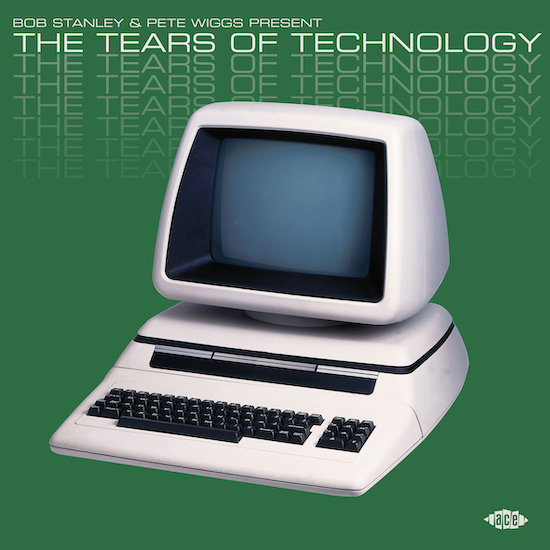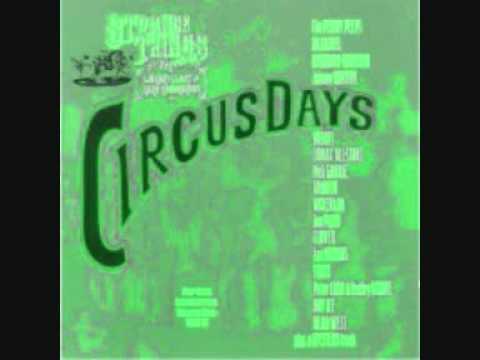Bob Stanley and Pete Wiggs aren’t just members of St Etienne, one of the best Indie-pop groups the UK has ever produced. They’re also DJs, producers, and authors, whilst running one of the most competitive pop pub quizzes. Another string to add to this bow is compiler of compilations. Neither Stanley or Wiggs are strangers to this. Both have been putting out comps on Ace Records since 2017, but their recent two Tea and Symphony – The English Baroque Sound 1968 -1974 and Bob Stanley & Pete Wiggs Present The Tears Of Technology are something else.
The Tears of Technology is a compilation that celebrates early 1980s synthpop. It was a time of duos, usually a singer and a keyboard player, the more outlandish the appearance the better. Phil Oakley, we’re talking about you here. But you’d know this looking at the cover. Front and centre are what looks like a spiffy IMB PC or Commodore PET. This, along with the title, should let us know what we are in for.
If you were still uncertain, opening track ‘Jeans Walks in Fresh Field’ by China Crisis is a lithe 1:50 of cascading melodies and haunting keys. While the music is stark, there is a warmth to it. In all fairness it’s bloody brilliant and wouldn’t be out of place on an episode of Stranger Things, maybe during a montage of Eleven and Max having fun while Mike and Lucas look on. ‘Unless’ by The Pale Fountains and ‘Real to Real’ by Simple Minds are more slabs of stark menace but bubbling under the surface is a sense of fun and whimsy.
The standout track is by folk-punk pioneer Patrik Fitzgerald. In 1982, Fitzgerald ditched his guitar for a synth and released this track ‘Personal Loss’ on his Gifts and Telegrams album. Here, Fitzgerald delivers the same level of social commentary with the usual biting lyrics, but it feels more direct than his better-known folk-punk work. ‘Personal Loss’, and the album, shows the synth is something more than just a box of noises and rhythms. With the right operator it became something that could deliver tender motifs and catchy melodies as the guitar was before it.
Tea and Symphony – The English Baroque Sound 1968–1974 is an official companion to the 2007 release Tea and Symphony – The English Baroque Sound 1967–1974. The original was released on Castle Music, a sub label to the defunct Sanctuary, and now passes hands for large sums in record shops and Discogs. Four of its original songs are on the follow up.
The standout tracks on Tea and Symphony are ‘I Can’t Let Maggie Go’ by The Honeybus and ‘Alice’ by Jon Plum. Both have gloriously intricate verses and bombastic courses. Part Scott Walker kitchen sink drama, part ‘Eleanor Rigby’. A surprise inclusion is ‘Forever Autumn’ by Vigrass and Osborne. The eager eared will recognise it as the original version of the song Justin Hayward performed on Jeff Wayne’s War of the Worlds. The original has a looser vibe than the top five hit single, but those strings drip with elegance. With each note you are pulled deeper and deeper into pastoral world.
What is most impressive about Tea and Symphony is how tight the instrumentation is. It’s ripe for sampling. The strings on Erasmus Chorum’s Mary Jane wouldn’t be out of place on a Wu-Tang or Kanye release.
What is apparent after listening to these albums is Stanley and Wiggs have trawled through countless label archives, private collections – and their own memories – to curate two compilations that show us a glimpse of a different time, a time when melancholy was king. Where all you needed was a bit of imagination and you could transport the listener so another place. Tea and Symphony feels like an extended Wes Anderson soundtrack at times. This is a good thing.
The music is filled with whimsy that takes you out of the drudgery of your life and transports you to a place where anything feels possible. Will you be embroiled in a murder mystery as you go and buy veg? Will an unknown relative accost you on your lunch break then drag you off to an adventure? Or will a simple camping holiday end in taking shelter from the elements and adversaries in a disused library? The answer is probably not, but whilst listening to Tea and Symphony anything feels possible. And isn’t that what you really want from music?




